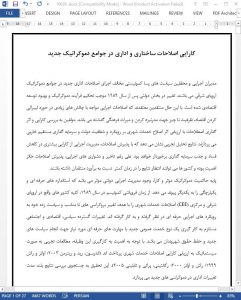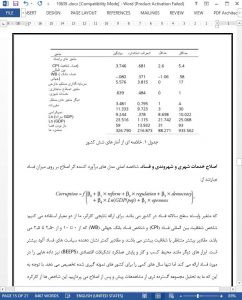Practitioners and scholars of postcommunist politics disagree on the accomplishments of administrative reforms in new Eastern European democracies. The transformation of the public sector after 1989 has aimed to consolidate the democratic process and enhance economic development. Skeptics, however, argue that administrative reforms face serious challenges in the context of economic liberalization, insuffi cient capacity for modernization, and cultural legacies of the past. The authors judge reform effectiveness by testing the impact of civil service reform on government transparency and foreign direct investment. The results of the empirical analysis confirm that once reform is adopted, administrations become more eff ective at reducing corruption and attracting investment. Despite the delays and difficulties of implementation, the adoption of reform is important in and of itself, and countries can expect positive results sooner than skeptics predict.
A pillar of effective democratic governance is the existence of effi cient public administration that adheres to professional standards and integrity. Since the collapse of communism in 1989, all of the countries in Central and Eastern Europe (CEE) have undergone civil service reforms aiming to transform their highly politicized and ineffi cient bureaucracies into modern professional administrations. The massive political, economic, and social transformation required the establishment of a new type of public service, one with the professional skills needed to carry out new policies and protect citizen rights. The importance of this task notwithstanding, there has been a dearth of empirical studies systematically assessing the effectiveness of civil service reforms (see Anderson, Reid, and Ryterman 2003; Evans and Rauch 1999; Rauch and Evans 2000; Recanatini, Prati, and Tabellini 2005). This study seeks to uncover the long-term outcomes of administrative transformation in new democracies.
Conclusion
Th e principal fi nding of this analysis is that the existence of civil service reform is systematically associated with lower levels of public sector corruption in postcommunist countries. The civil service laws introduced arange of disciplinary measures seeking to constrain irresponsible behavior in the public sector and increase accountability. These laws introduced the meritocratic principle of recruitment and the prospect of long-term careers based on individual competence and performance, which, in turn, was expected to discredit the short-term benefi ts of corrupt practices. We hypothesized that administrative reform facilitates transparent governance and found empirical evidence to support this expectation.











